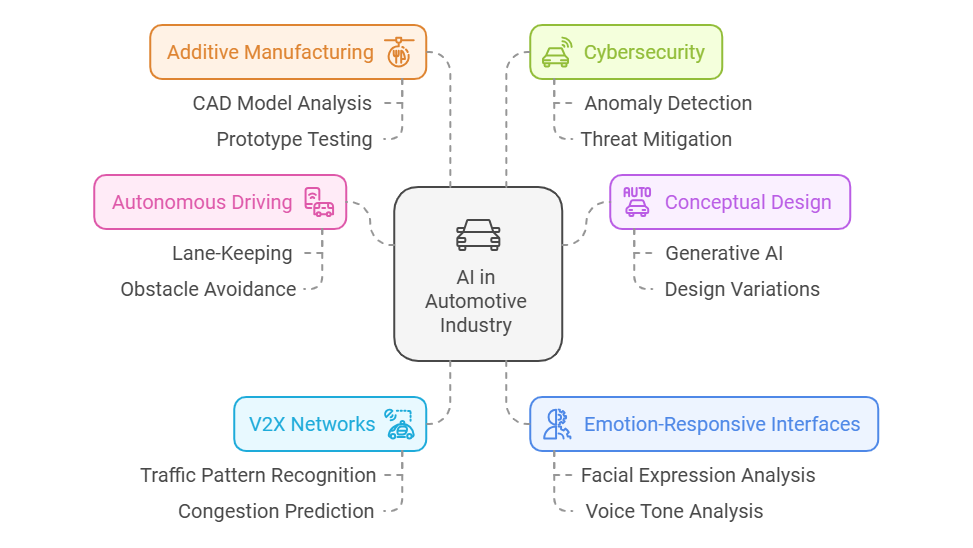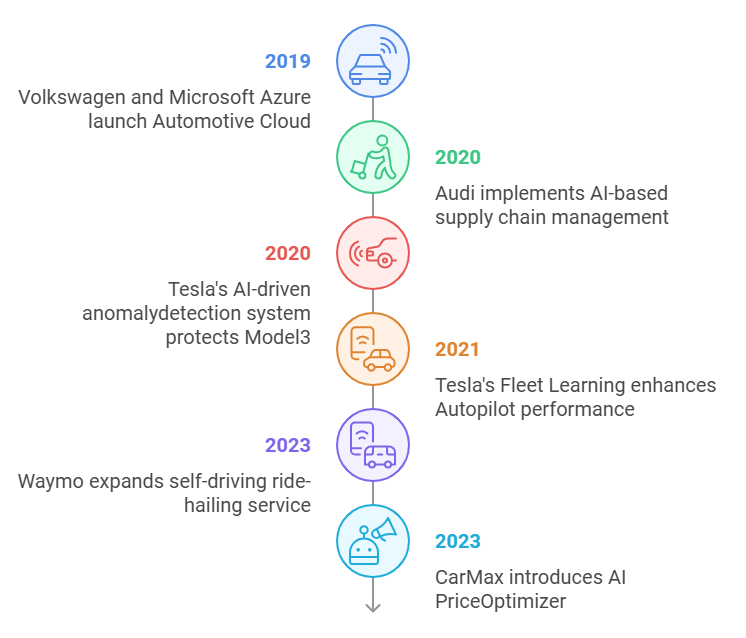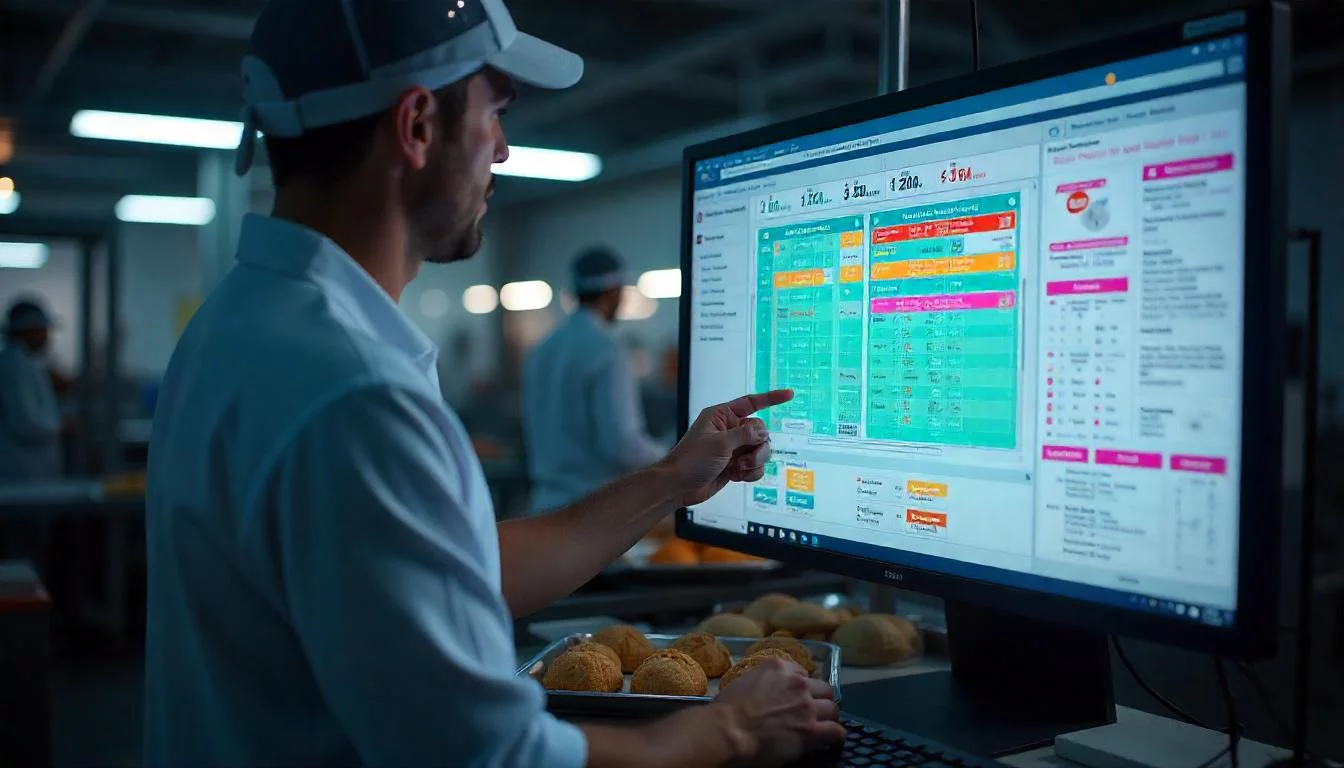Imagine a world where cars can think, learn, and even empathize. It might sound like something out of science fiction, but it’s already becoming a reality. The automotive industry is undergoing a major transformation, with integration of AI in automotive industry. The push for safer, more efficient, and sustainable transportation is driving this change. With increasing pressure from stricter emission regulations and the demand for advanced safety features, personalized experiences, and seamless software connectivity, traditional systems fall short. AI steps in as the perfect co-pilot, processing vast data, learning from patterns, and making real-time decisions.
According to the NMSC’s autonomous vehicle market forecast, the global autonomous vehicle market reached nearly the size of 106 billion U.S. dollars in 2021. It is projected that in 2030, the market will reach the size of over 2.3 trillion U.S. dollars. AI in automotive market improving engine efficiency & enhancing safety. We’ve highlighted 15 key use cases & solutions leading this revolution. Let’s explore!
Best Use Cases of AI in Automotive Industry
1. Autonomous Driving
Artificial intelligence in automotive market is the driving force behind autonomous vehicles, enabling them to interpret vast amounts of data from sensors like cameras, lidar, radar, and GPS to gain a complete understanding of their surroundings. Machine learning algorithms, particularly deep neural networks, are trained on countless driving scenarios to identify objects, predict movements, and make rapid decisions. This allows AI to manage tasks such as lane-keeping, obstacle avoidance, route planning, and following traffic laws. It continuously learns and adapts to new situations, enhancing its capabilities over time. AI also powers Advanced Driver Assistance Systems (ADAS), providing real-time support to drivers through features like traffic sign recognition, blind-spot monitoring, and automatic emergency braking.
In 2023, Waymo, Alphabet’s autonomous driving company, expanded its fully self-driving ride-hailing service in San Francisco and Phoenix. Their AI-powered vehicles, equipped with advanced sensors and algorithms, have traveled millions of miles without human control, demonstrating the transformative potential of AI in transportation.
2. Automotive Conceptual Design
Generative AI is revolutionizing the conceptual design process by utilizing machine learning algorithms to develop innovative vehicle designs based on specific parameters and limitations. These AI systems are trained on extensive databases of car designs, market trends, aerodynamic principles, and manufacturing constraints. They can produce thousands of design variations in a fraction of the time it would take human designers. Advanced neural networks enable AI to incorporate abstract ideas like “sportiness” or “luxury” into the designs. Additionally, AI can generate and test thousands of virtual prototypes much faster than building and testing physical models.
For example, Pininfarina’s “AI Design Lab” developed a hypercar concept using AI. This approach reduced the time needed for initial concept development from months to just weeks, while exploring a much larger range of design possibilities than human designers could handle alone.
3. Collaborative Vehicle-to-Everything (V2X) Networks
AI in cars is integral to enabling and optimizing Vehicle-to-Everything (V2X) communication networks. Deep learning models process data from vehicle sensors, traffic cameras, and weather stations to recognize traffic patterns, predict congestion, and recommend efficient routes. AI also supports cooperative adaptive cruise control, allowing vehicles to communicate and maintain safe distances, improving overall traffic flow.
Audi’s “Traffic Light Information” system demonstrates the potential of V2X technology. This AI-driven system communicates with traffic lights, giving drivers speed recommendations to hit green lights. Early users reported reduced travel times and better fuel efficiency.
4. Emotion-Responsive Vehicle Interfaces
Emotion-responsive vehicle interfaces utilize AI to detect and respond to the driver’s emotional state, enhancing both safety and comfort. These systems combine computer vision, voice analysis, and biometric sensors to monitor the driver’s emotions in real-time. Machine learning algorithms process this data to identify feelings such as stress, fatigue, anger, or happiness. Based on the emotional state, the AI adjusts various aspects of the vehicle, such as ambient lighting, music, climate control, or the responsiveness of controls. If stress or fatigue is detected, the system may increase the sensitivity of safety features or suggest a break.
BMW’s “Emotional Intelligence” system, featured in their 2024 7 Series, demonstrates this technology by analyzing facial expressions, voice tone, and physiological data to assess the driver’s emotional condition.
5. Additive Manufacturing for Custom Parts
AI algorithms analyze CAD models and performance requirements to create optimized designs tailored for additive manufacturing (3D printing). These systems take into account factors like material properties, structural strength, weight reduction, and manufacturing limitations. Machine learning models also predict how different designs will perform under various conditions and optimize the printing process itself, determining ideal parameters such as layer thickness, print speed, and infill patterns to achieve the desired results.
Mercedes-Benz’s “3D AI” system highlights the potential of AI in additive manufacturing. This technology optimized the design and production of custom brake calipers, reducing production time and minimizing material waste.
6. Automotive Cybersecurity Threat Detection
As vehicles become increasingly connected, AI in automotive market plays a vital role in safeguarding them from cyber threats. AI-driven cybersecurity systems leverage anomaly detection, behavioral analysis, and predictive modeling to detect and mitigate threats in real-time. Deep learning models are trained on known attack methods and can detect new, previously unidentified threats. In addition to threat detection, AI systems can automate responses by isolating affected systems and implementing countermeasures in real-time.
In 2020, security researchers showcased a vulnerability in a Tesla Model 3 by gaining remote control of the vehicle’s systems. However, Tesla’s AI-driven anomaly detection system swiftly recognized the unusual commands, flagged them as potential threats, and isolated the compromised systems.
7. Dynamic Pricing for Automotive Retail
AI is revolutionizing automotive retail by enabling advanced dynamic pricing strategies. These systems process large volumes of data, such as market trends, competitor prices, inventory levels, and customer behavior, to adjust prices in real-time. The objective is to maximize sales and profits while providing competitive and personalized pricing for customers.
CarMax’s “AI PriceOptimizer,” rolled out across their U.S. stores in 2023, showcases the potential of AI in automotive retail pricing. The system dynamically adjusts vehicle prices in real-time, considering over 100 different variables.
8. Automated Quality Inspection in Manufacturing
Computer vision systems, driven by deep learning algorithms, enable the inspection of components and assembled vehicles with speed and precision that exceed human capabilities. These AI systems are trained on extensive image datasets featuring both defective and non-defective parts, enabling them to detect even the smallest imperfections. The AI identifies issues like paint defects, welding inconsistencies, or misaligned components in real-time as vehicles progress along the production line.
In 2022, Audi introduced an AI-powered quality control system at its Ingolstadt plant. This system uses high-resolution cameras and machine learning to examine vehicles for even the most minor defects, detecting imperfections as small as 1mm, including subtle paint flaws.
9. Battery Management Systems for Electric Vehicles
AI enhances battery performance and lifespan in electric vehicles by analyzing data from various sensors. Machine learning algorithms predict battery degradation, optimize charging cycles, and adjust power distribution according to driving conditions and habits. The Artificial Intelligence in car considers factors like temperature, charging history, and driving habits to optimize range and extend battery life. Additionally, it offers accurate range forecasts and recommends the best times and locations for charging.
Tesla’s advanced AI-powered battery management system, introduced in the Model S Plaid, demonstrates this technology. The system uses machine learning to analyze the performance of individual battery cells and adjusts charging and discharging rates in real-time.
10. Personalized In-Vehicle Marketing
Artificial intelligence enables targeted and context-aware marketing within vehicles. By analyzing data from the vehicle’s systems, driver behavior, and external sources, AI can deliver tailored advertisements or offers. The system takes into account factors such as location, time of day, current journey purpose, and personal preferences to ensure the content is relevant and minimizes distractions.
In 2021, Volkswagen collaborated with an AI company to introduce an in-vehicle marketing platform in select models. The AI evaluates factors like the car’s location and fuel level to recommend appropriate services. For example, when the fuel is running low, it may offer a coupon for a nearby gas station.
11. Autonomous Manufacturing Systems
AI is revolutionizing automotive manufacturing by managing complex production processes. These systems utilize machine learning algorithms to optimize production workflows, coordinate robotic operations, and regulate adaptive processes in real-time. By integrating machine vision and sensor data, AI can make immediate adjustments to ensure quality and efficiency, leading to faster production, fewer errors, and enhanced scalability.
BMW has adopted an AI-driven production system at its Regensburg plant in Germany. This system leverages machine learning to analyze images from cameras along the production line, detecting quality issues in real-time.
12. Collaborative Vehicle Development
Cloud-based AI platforms facilitate seamless collaboration among global teams. These systems utilize shared data and computing resources, enabling engineers around the world to work together on projects in real-time. Machine learning models analyze extensive design, testing, and simulation data stored in the cloud, speeding up the development process, allowing for rapid iterations, and promoting knowledge sharing across departments and locations.
In 2019, the Volkswagen Group teamed up with Microsoft Azure to launch the Automotive Cloud. This platform improves VW’s vehicle software development by allowing global teams to collaborate and utilize cloud-based AI for simulations and testing. VW has reported notable improvements in their software development efficiency.
13. AI-Driven Automotive Supply Chain Management
AI in automotive industry plays a key role in automotive supply chain management by utilizing predictive analytics and intelligent optimization. Machine learning algorithms process global supply chain data, considering factors like geopolitical events, weather patterns, and market trends. This enables proactive decision-making in inventory control, demand forecasting, and risk management. By anticipating potential disruptions, AI helps automakers maintain production flow, reduce costs, and strengthen supply chain resilience.
In 2020, Audi implemented an AI-based supply chain management system to predict disruptions. Since then, Audi has used an AI tool to monitor sustainability risks within its supply chain. The AI acts as a proactive alert system, enabling Audi to quickly address potential risks. If any violations are detected, Audi can require immediate corrective actions from suppliers or even terminate contracts if necessary.
14. Real-Time Vehicle Performance Optimization
This innovative method leverages the power of the cloud and AI to analyze real-time data from connected vehicles, optimizing performance and efficiency across entire fleets. By processing vast amounts of data from millions of vehicles, patterns and improvement opportunities are identified. The system then sends personalized, real-time adjustments to each vehicle’s onboard systems, enhancing performance, fuel efficiency, and user experience. This continuous learning and optimization cycle marks a significant shift in vehicle performance management.
Tesla’s “Fleet Learning” technology collects data from its vehicles to enhance Autopilot performance. In 2021, Tesla reported that the system had analyzed over 3 billion miles of driving data, leading to ongoing improvements in Autopilot safety and efficiency.
15. Predictive Analytics for Automotive Supply Chain Management
Advanced AI systems are improving supply chain operations by forecasting potential disruptions and automatically recommending strategies to mitigate them. These platforms process a wide variety of global data, such as geopolitical events, natural disasters, market trends, and supplier performance records. By simulating different scenarios, AI enables automakers to adjust their supply chain strategies proactively. This predictive ability also supports better decision-making, risk management, and the creation of a more stable and efficient supply chain amidst global uncertainties.
Ford Motor Company has adopted predictive analytics to improve its supply chain management, especially in handling disruptions caused by global events like the COVID-19 pandemic. Using predictive models, Ford forecasts potential issues, such as parts shortages or transportation delays.
Conclusion: Why AI in Automotive?
The futuristic vision of intelligent vehicles is swiftly becoming a reality driven by the transformative capabilities of AI in automotive industry. The automotive industry is undergoing a profound transformation with AI acting as the key force shaping a future where cars are more than just machines. Along with the innovations AI in automotive market is driving more opportunities to entrepreneurs in automotive industry This shift goes beyond technology. It’s a complete change in perspective where the driving experience evolves from simple transportation to an era of intelligent mobility.
The development of AI-powered mobile apps that interact with vehicles opens new possibilities for advanced user interfaces and connectivity. For businesses and entrepreneurs looking to develop advanced AI-powered automotive apps, partnering with a mobile app development company specializing in AI and vehicle technologies is the ideal choice. They offer the expertise to create secure, user-friendly, and scalable apps that integrate seamlessly with AI systems and automotive technologies.
FAQs
Automakers can leverage AI to enhance vehicle safety and performance. AI-driven sensors and cameras can identify potential road hazards, contributing to accident prevention and overall improved safety.
AI technologies are already improving the efficiency of the automotive industry. By increasing automation and reducing development time, AI can enhance various stages of the supply chain and streamline manufacturing processes.
AI in self-driving vehicles is employed for tasks like sensing the environment, making decisions, predictive modeling, and processing natural language.
AI is employed in systems like advanced driver assistance systems (ADAS), human-machine interfaces (HMI), and in-vehicle infotainment (IVI), improving both vehicle safety and user experience.
Wondering how AI can transform your automotive business? Book a FREE consultation












